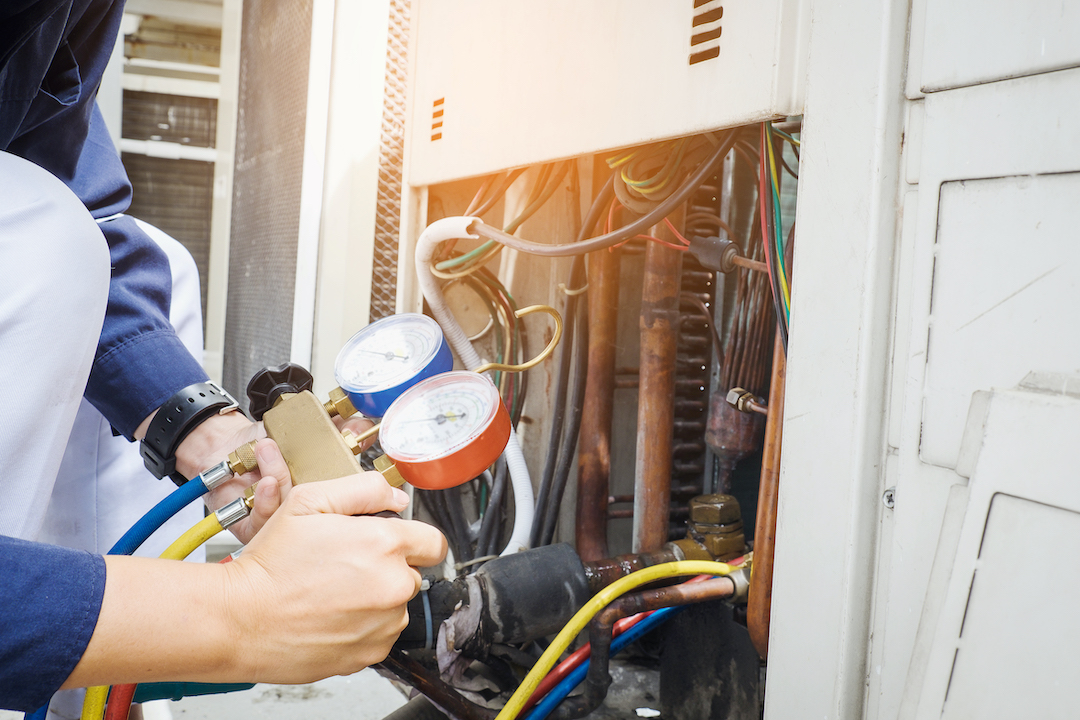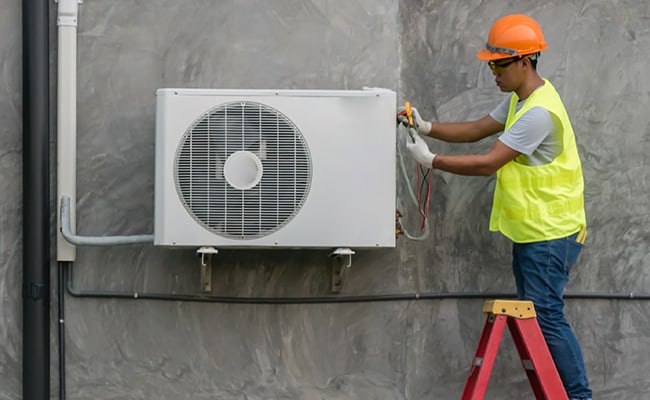What You Need to Know About heat pump replacement ooltewah tn
Wiki Article
Picking In Between a Heat Pump and Heating System: Key Factors To Consider for Your A/c Needs
When evaluating home heating choices for heating and cooling requires, the choice between a heatpump and a heater can be intricate. Each system uses distinct benefits customized to certain environments and power effectiveness goals. Comprehending these distinctions is important for making an educated choice. Key elements such as installation costs and ecological influence better make complex the option procedure. Which choice really aligns with one's convenience and sustainability preferences? The complying with sections will certainly discover these factors to consider carefully.Understanding Heat Pumps: How They Function and Their Advantages
While lots of house owners take into consideration numerous home heating choices, understanding exactly how heatpump feature and their advantages can significantly influence their decision. Heatpump run by transferring warmth rather than generating it. In the winter season, they remove warm from the outside air or ground and move it inside your home, while in the summer, they reverse this procedure, cooling the home by eliminating warm outside. This dual capability makes them flexible for year-round environment control.One of the primary advantages of heat pumps is their power effectiveness. They utilize significantly much less electrical energy contrasted to standard furnace, potentially causing lower energy bills (furnace replacement). Furthermore, warmth pumps have a smaller carbon impact, making them an eco-friendly choice. They likewise require less upkeep than conventional systems, adding to long-term expense savings. Overall, understanding the technicians and advantages of heatpump can help property owners make notified choices concerning their home heating and cooling down requirementsChecking Out Heating Systems: Types, Operation, and Benefits
Heaters come in numerous kinds, consisting of gas, electrical, and oil models, each with distinctive functional systems. Recognizing these distinctions is important, as they impact performance and heating performance. Additionally, heaters use many benefits, such as regular heat output and reliability in colder climates.Kinds of Furnaces
Home heating systems can vary substantially in style and operation, with furnaces being a popular option amongst house owners. There are a number of types of furnaces, each using various fuel sources and innovations. Gas heaters are typical, leveraging all-natural gas to generate warm successfully. Electric heaters, on the various other hand, use electric resistance to generate heat, often favored for their simple setup. Oil heaters, while much less usual, are reliable in locations with restricted gas access (heat pump replacement ooltewah tn). Furthermore, condensing heaters optimize energy performance by catching and reusing exhaust gases. Each kind runs via a system of warm exchangers and ductwork to disperse cozy air throughout a home. Understanding the differences between these heating system kinds is essential for educated HVAC choicesAdvantages of Heating systems
For property owners seeking dependable heat during cool months, the advantages of furnaces are substantial. Heating systems give constant heating, making certain even temperature levels throughout the home. They are especially reliable in extreme chilly, usually surpassing heatpump in cold problems. Different kinds, consisting of gas, electric, and oil heaters, supply adaptability to satisfy diverse requirements and preferences.Furnaces additionally tend to have reduced preliminary setup expenses compared to heat pumps, making them a much more accessible option for several. Their durable layout adds to a longer life-span, with many devices lasting over 15 years with proper upkeep. Additionally, modern heating systems are often geared up with innovative innovation for boosted effectiveness, which can lead to minimized energy costs. Overall, furnaces continue to be a reliable choice for efficient home heating.
Energy Performance: Comparing Heat Pumps and Furnaces
When comparing energy efficiency between heatpump and furnaces, the Seasonal Power Effectiveness Ratio (SEER) plays an essential function in determining performance. Furthermore, a functional cost evaluation discloses the long-lasting economic implications of each system. Recognizing these factors can assist home owners in making notified choices concerning their home heating options.Seasonal Power Effectiveness Ratio
Energy efficiency plays an essential role in the decision-making procedure between heatpump and furnaces, specifically when considering the Seasonal Energy Efficiency Ratio (SEER) This metric measures the cooling effectiveness of heat pumps over an entire air conditioning season, giving a standard means to assess performance. Higher SEER scores suggest better power performance, converting to reduced energy intake and minimized utility bills. In comparison, heating systems are typically examined utilizing the Annual Gas Usage Effectiveness (AFUE) rating, which reflects home heating performance. When comparing these 2 systems, homeowners must focus on SEER ratings for heatpump, as they straight impact overall energy financial savings and ecological sustainability. An extensive understanding of SEER can especially affect the lasting satisfaction and cost-effectiveness of the chosen heating and cooling option.Operational Expense Analysis
Understanding the operational expenses associated with heatpump and furnaces is vital for homeowners assessing their options. Heatpump normally offer greater energy performance, converting electric energy right into warm with minimal waste. This leads to reduced monthly energy expenses, especially in modest environments. Alternatively, standard heating systems, particularly gas versions, may have lower upfront prices yet can sustain greater operational expenditures over time as a result of sustain costs and efficiency ratings.Moreover, heatpump can operate as both heating and cooling down systems, possibly reducing the requirement for separate heating and cooling systems. While first investments for heatpump might be greater, their long-lasting savings in power efficiency can make them a much more economical option for several homes. Cautious analysis of regional power rates is vital to establish the most effective alternative.Installation Costs: What to Expect for every Heater
Installment costs for heater can differ considerably in between heatpump and furnaces, affecting home owners' choices. Heatpump generally have higher in advance installment expenses, typically varying from $3,500 to $8,000, depending on the unit size and intricacy of installment. This consists of the outside system, indoor handling system, and needed ductwork modifications. On the other hand, furnaces have a tendency to have reduced first costs, averaging in between $2,500 and $6,000, which can be appealing for budget-conscious home owners. However, installation costs can boost if comprehensive ductwork is required.Moreover, the option of fuel kind for heating systems-- gas, lp, or electric-- can additionally influence installation prices. While warmth pumps use energy performance, their preliminary financial investment might discourage some customers. Eventually, reviewing setup expenses together with long-lasting financial savings and performance will certainly help property owners in making informed decisions about their furnace.Climate Considerations: Which System Performs Much Better in Your Area
Exactly how do climate conditions affect the performance of furnace? The performance of heatpump and heaters can differ significantly depending on the local climate. In modest environments, heatpump excel by effectively transferring warm from the outdoors air, making them an energy-saving choice. Their efficiency lessens in very cool temperature levels, where they might have a hard time to draw out sufficient warm. On the other hand, furnaces, specifically gas versions, offer trustworthy and consistent heat no matter outdoor YOURURL.com conditions, making them preferable in chillier regions.In areas that experience milder winters months, warmth pumps can operate properly year-round, giving both heating and air conditioning. In comparison, regions with harsh wintertimes usually gain from the toughness of heating systems. Ultimately, understanding the regional environment is vital when choosing between a warmth pump and a heater, as it straight impacts their functional performance and overall efficiency.Maintenance Needs: Long-Term Look After Warmth Pumps vs. Furnaces
While both heatpump and furnaces need regular upkeep to guarantee peak efficiency, their certain requirements and treatment routines differ considerably. Heaters usually need less constant interest, with yearly inspections sufficing to look for gas leakages, clean filters, and analyze total functionality. Their simpler design commonly permits straightforward repairs.In contrast, heatpump require biannual upkeep due to their dual function in home heating and cooling. This consists of cleaning coils, checking cooling agent degrees, and making sure that both the outside and indoor devices function at their finest. In addition, heat pump upkeep usually includes more elaborate parts, making specialist servicing essential.Neglecting upkeep can result in reduced efficiency and raised power prices for both systems. Eventually, house owners must take into consideration these long-lasting treatment demands when choosing between a heat pump and a heating system, as positive maintenance can extend the life expectancy and performance of either system significantly.Ecological Influence: Picking a Lasting Heating Alternative
The ecological effect of home heating systems is an click here to read important analysis for house owners seeking lasting alternatives. Heatpump are typically more energy-efficient than conventional furnaces, as they move warmth instead than create it, considerably decreasing carbon discharges. By utilizing renewable resource resources, such as geothermal or air-source heatpump, house owners can additionally decrease their ecological footprint.On the other hand, all-natural gas heating systems discharge greenhouse gases and add to air pollution, though they frequently supply higher warm outcome. Improvements in innovation have led to the growth of high-efficiency furnaces that reduce emissions.Ultimately, picking a home heating system includes evaluating effectiveness versus ecological effect. House owners are motivated to review regional energy resources and motivations for eco-friendly systems, guaranteeing an option that aligns with both personal comfort and ecological obligation. The choice affects not just prompt comfort yet additionally long-term sustainability and environmental health.Regularly Asked Concerns
How Much Time Do Warm Pumps and Furnaces Usually Last?
The lifespan of warmth pumps commonly varies from 15 to 20 years, while furnaces can last between 15 to 30 years. Normal upkeep considerably influences their longevity and performance in giving heating services.Can I Make Use Of a Heatpump in Exceptionally Cold Climates?
Heat pumps can operate in extremely cold environments, yet their effectiveness reduces as temperature levels decrease. In such problems, additional home heating sources may be essential to preserve comfy indoor temperatures and assure peak performance.
What Is the Sound Level of Warm Pumps Versus Furnaces?
The noise levels of warmth pumps and furnaces vary substantially. Typically, warmth pumps run even more silently than typical heating systems, making them preferable for those delicate to seem, while furnaces might generate louder operational noises during home heating cycles.
Are Warm Pumps Suitable for Both Heating & Cooling?
Heat pumps are without a doubt suitable for both heating & cooling (ductless mini splits). They operate by transferring heat, giving efficient temperature level control year-round, making them a flexible choice for home owners seeking an all-in-one heating and cooling solutionWhat Dimension Heater Do I Required for My Home?
Establishing the appropriate size furnace for a home calls for assessing factors such as site here square footage, insulation high quality, regional environment, and the home's layout. Consulting a specialist can assure an exact assessment and suitable convenience. Heat pumps generally use greater power effectiveness, converting electrical power right into heat with minimal waste. In moderate climates, heat pumps excel by effectively transferring warm from the outside air, making them an energy-saving choice. Conversely, heating systems, especially gas models, provide consistent and reliable warm no matter of exterior problems, making them more suitable in chillier regions.In locations that experience milder winter seasons, warm pumps can run properly year-round, supplying both heating and cooling. Heat pumps are usually much more energy-efficient than standard heating systems, as they transfer warm instead than produce it, greatly minimizing carbon emissions. By making use of renewable energy sources, such as geothermal or air-source heat pumps, house owners can additionally reduce their environmental footprint.On the various other hand, natural gas heating systems emit greenhouse gases and contribute to air contamination, though they commonly give higher warm outcome.Report this wiki page